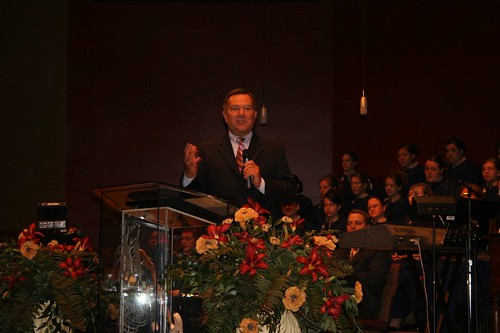14th Sunday in Ordinary Time (B)
Picture: cc Garrette
My dear friends, do you know what it means when someone says to me, you’re only preaching to the choir? I’m sure you do, right? It means that I am trying to convince people who already agree with me. Or trying to convert the already converted. The implication being that I’m wasting my time. I should try to win over the unconverted instead. Those who hold opinions contrary to mine. Those who are more likely to reject my arguments, and to treat me with hostility. Which, though difficult, makes a lot of sense, don’t you think?
And yet, my dear brothers and sisters, has it ever occured to you that preaching to the choir is what priests like me do all the time? Of course, this being the earliest Mass on a Sunday, we don’t have much of a choir to speak of. But still, in a sense, aren’t all of us members of the choir? Can we not expect most, if not all, of us gathered here this morning to be already converted? Already convinced of the Good News of Christ? Why then do priests like me even bother?
Now please don’t be mistaken, my dear friends. I ask this question not because I’m suffering a vocation crisis. But because of what we find in our Mass readings today. As you may have noticed, in each of our three readings, we find people sent to preach God’s Word to those who are resistant.
I am sending you, God tells Ezekiel in the first reading, to the rebels who have turned against me… And they would not accept him… This is what the gospel says about those to whom Jesus preaches. And, finally, in the second reading, although it’s not clear what exactly St Paul means, when he writes about a thorn in the flesh, some commentators say that this points to hostility against Paul’s ministry. Since the apostle goes on to write about insults, hardships, persecutions, and the agonies that he suffers for Christ’s sake.
So it is clear that the prophets in our readings are sent to preach to those who are stubbornly unreceptive. But where, my dear friends, where are these stubbornly unreceptive people to be found? The answer may surprise us. The rebels to whom Ezekiel is sent in the first reading are none other than the Israelites themselves. God’s own chosen people. Scholars tell us that the hostility Paul writes about in the second reading very likely comes from members of his own communities. And, of course, the lack of faith that Jesus encounters in the gospel comes from his own relatives. The members of his own home town. From people gathered to worship God in the synagogue no less.
In other words, in our readings today, contrary to what we might expect, God’s messengers meet with resistance and even hostility not when they proclaim the Word to strangers, but when they are preaching to the choir! What do you make of all this, my dear friends? How does it make you feel? To some extent, it causes me to tremble interiorly. Especially because I so easily consider myself already a member of the choir. Presumably already converted. And yet these readings invite me to ask myself, what kind of a choir-member am I, really? How truly converted? How receptive and responsive to God’s Word, to God’s call? How do I even find out?
One way to find out is to see how our readings describe those who are truly receptive and responsive to God’s call. The first reading begins with these words: The Spirit came into me and made me stand up… This is one sign of the converted. Such a person is given the strength to stand up. To stand up and to speak out. To stand up, to speak out, and to bear witness to God’s message. Not just in words, but through one’s life. To stand up, to speak out, and to bear witness to God’s love, even in a hostile environment. To stand up, even when it is more convenient, more comfortable, more secure simply to remain sitting or lying down.
And let’s not be naive. To do this is not easy. It’s not easy to stand up when there are many powerful forces keeping us down. Forces both external and internal. Temptations and distractions, fears and anxieties, pressuring us to keep quiet and to simply blend in with the environment, with everyone else. To do otherwise, to go against the flow, may lead us to feel as the psalmist feels, when he says, We are filled with contempt. Indeed all too full is our soul with the scorn of the rich, with the proud man’s disdain. How then does the truly converted person receive the strength to remain standing?
We find the answer in the response to the psalm. Our eyes are on the Lord till he shows us his mercy. To keep on standing up, even when sorely tempted to lay down, I must keep my eyes focused on the Lord till he show us his mercy. Isn’t this what sets apart those who are truly converted from those who are still rebellious? And, if I am honest with myself, must I not admit that, much as I may consider myself a member of the choir, there’s actually a bit of both in me? Both the receptive and the resistant. Both the converted and the sinner. Which is why I need to keep on listening to the Lord’s Word. To keep on allowing it to penetrate my heart. Calling me to deeper conversion. Calling me to ever more generous, ever more committed, mission.
My dear sisters and brothers, if today you hear the Lord’s voice preaching to the choir, what will you do to keep from hardening your heart?

